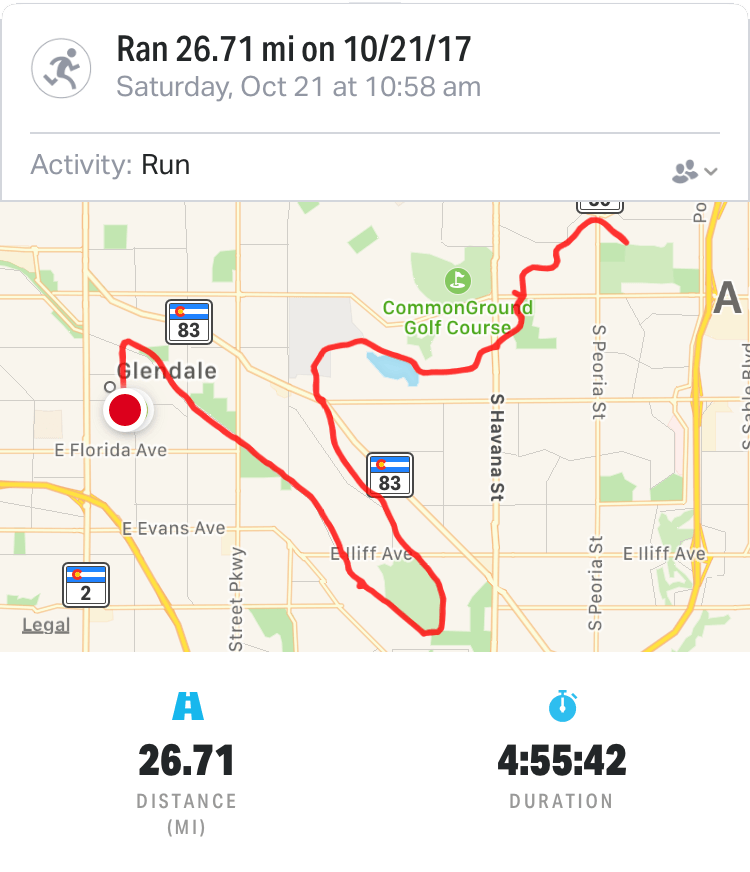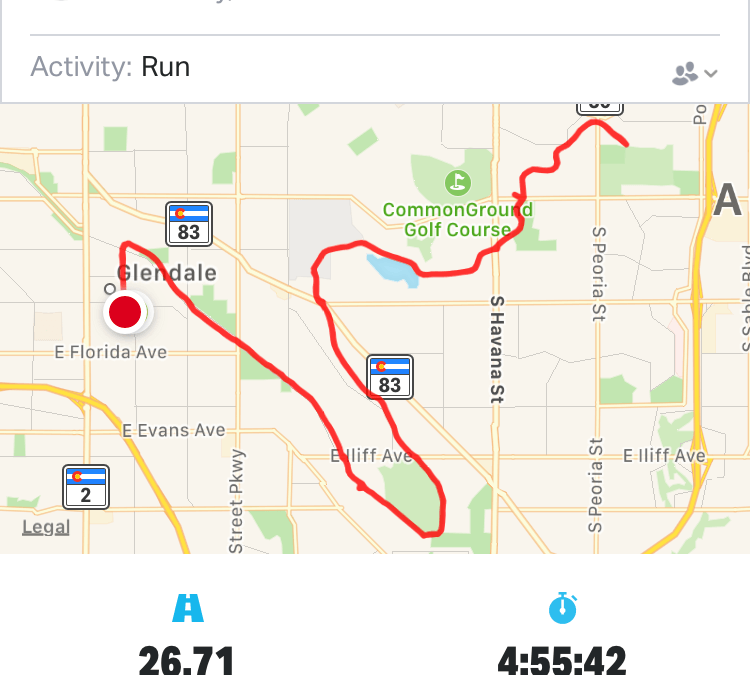The Mental Game of Marathons:
How I trained and completed a marathon in 7 days
“There are no limits to what you can accomplish, except the limits you place on your own thinking.” Dr. Travis Bradberry
Training Schedule |
|
|---|---|
 |
* MM – Morning Meditation Sunday, Oct. 15, 2017 | 10 min MM, 3.2 mile run Monday, Oct. 16, 2017 | 10 min MM, 6.4 mile run Tuesday, Oct. 17, 2017 | 20 min MM, 8.7 mile run Wednesday, Oct. 18, 2017 | 20 min MM, 16.4 mile run Thursday, Oct. 19, 2017 | 20 min MM, 10 mile bike, 20 min stretch Friday, Oct. 20, 2017 | 30 min MM, 30 min stretch Saturday, Oct. 21, 2017 | 30 min MM, 26.71 mile run |
Here are some personal factors to consider before we get started: I’m 28, lift on a daily basis, I have been a casual smoker and drinker since my fraternity days at Indiana University (Alumni 2012), I haven’t run more than 4 miles continuously in the last 5 years despite being a runner in high school. I have never run long distances at elevation (Denver, CO. 5280 ft.). The MOST important detail, 2 years ago I began studying mental strength and meditation.
When I first told friends that I was going to train and run a marathon in 7 days, I heard every stereotypical, “are you f@#king crazy?” response known to man. Over the next 6 days of training, I had 17 people tell me it was “impossible”, 6 ask “why”, 5 ask if I was doing “ok”, and 2 say that I would get injured. Armed with doubt from my friends, I set out to focus on the process and the mental strain a marathon would put on me rather than the physical strain. My hypothesis was: If I could recondition my mind to reject excuses, manage emotions and process temporary physical pain rationally, I could run any distance under 50 miles.
Reject excuse: We all have excuses at one point or another. Especially when tasked with something uncomfortable or challenging. I wanted to hear every excuse for why I would tell myself that I couldn’t run a marathon. Every morning as I sat quietly in thought, I would pull out past experience of physically demanding situations and every time I had failed. I looked at the excuses I was giving myself and had a combative response whenever my mind would throw an excuse to the forefront of my thoughts. While running, I focused on all of the negativity and excuses my mind was giving my body. I then mentally processed that excuse, organize it in mental storage and forgot about it. Because of this conditioning, I ran the entire marathon absent of negativity and excuses.
Manage Emotions: Have you ever noticed that the last 40 miles of a daylong road trip can seem like nothing but then a 5-mile drive across town can seem like a hassle or time consuming? Your perspective can be skewed by your expectations and I wanted to make sure that my emotional state was even throughout the entirety of the 26.4 miles.
If I start mile 1 and focus on finishing mile 26, the distance will seem daunting, and I will most likely fail. The anxiety and stress of such a long distance can cause your mind to play tricks on you. Self-doubt will start to creep in, excuses will follow, your mind will start to tell your body that the stress is unbearable and your body will respond accordingly.
If I start mile 1 and focus on keeping a comfortable tempo, pull attention away from my body, let my mind wander, and enjoy the process, the miles fly by effortlessly. Enjoy yourself throughout the process, mentally prepare your emotions for success and focus on completing the marathon one step at a time.
Process Physical Pain Rationally: This doesn’t mean ignoring your pain or not listening to the signs your body is giving you. What I’m saying is that too often when you put yourself through difficult physical activity, your brain hones in on one single pain point or jumps around between a couple pain points. These usually start small, like the feeling of a blister on your foot or soreness in your quads, but can grow into focused acute pain that you think about for miles. Here’s a personal example from my run:
When I hit mile 9, my entire calf tightened and I felt like a body builder was pinching my achilles tendon. My first thought, “holy shit! My friends were right. I did over extend myself and my body wasn’t prepared for this”.
Immediately my mind switched focus and I began to go through the process of what my body was actually feeling. I stopped running and reevaluated how I felt while reflecting on what could have caused this. At this point the rational part of my brain began to kick in. I started thinking; “you ran 16.4 miles 2 days earlier in similar conditions, why is this happening after 2 days of rest? Your legs feel fine.” When I ran 2 days earlier I had a water bottle set up every 4.5-5 miles and took short breaks to rehydrate and reevaluate how I was feeling. During my marathon I ran with a camelback and had not realized that 9 miles had passed without a single sip of water. At this point my mind had been wandering for over an hour and I wasn’t sweating because the dry Denver air was making the sweat evaporate before I even noticed. I took 10-15 minutes to stretch and rehydrate then threw the entire experience out of my mind and continued on.
If I would have focused on the pinching in my leg and assumed the worst, I would have came up with an excuse, uber’d home and tried again another day (how do I know this for a fact? It’s happened before). Instead, I chose to reevaluate my condition, reassure myself that this was a simple issue that could be solved and pull my focus away from the temporary pain.
Marathon’s are hard! Which is why only 0.5% of the U.S. population has ever completed one. Although marathons are physically demanding, I would argue that a marathon is a greater test of your mental endurance. In the words of Dr. Travis Bradberry, “the only limits to what you can accomplish are the ones you put on your own thinking”, so Reject Excuses, Manage Emotions, Process Physical Pain Rationally, and you will give yourself the best opportunity to be one of the 0.5%.
learn or die. greg

